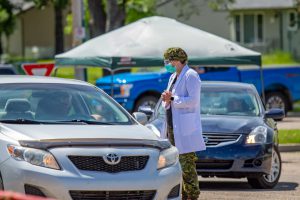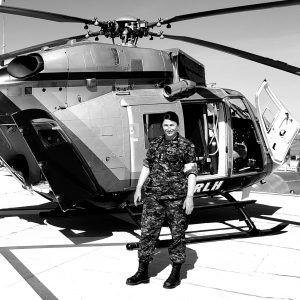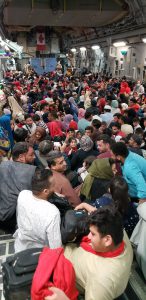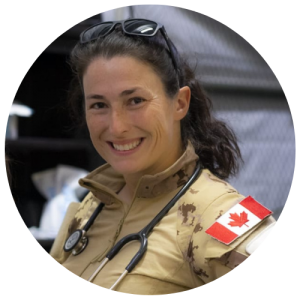Share
Medical Matters: Remembrance Day
Back to MessengerRead time: 7 minutes
By Maj M.K. (Meghan) Joiner, CD, MD, CCFP
I was honoured and humbled when my friend and colleague Dr. Scott McLeod, CPSA Registrar and CEO, asked me to write a column for The Messenger on the topic of remembrance. My mind immediately flashed back to the day where then Major (later Lieutenant-Colonel) Scott McLeod agreed to take a chance on me, a young Lieutenant, allowing me to deploy on his team to the Role 3 Multinational Medical Unit, Kandahar Airfield, Kandahar, Afghanistan. I didn’t know it then, but this experience would be pivotal in my life and is one of the major events that shaped me into the person I am today.
I’ve wanted to be a doctor since I was 11 years old, though I had no idea the journey to get there would be a long and winding one. In high school, I was always a good student, but never gifted, and I always needed to work hard to ensure my grades were high enough. While I excelled in biology and physics, chemistry was my nemesis. Even so, I demonstrated my passion in other ways; I started the first student-run clinic in a high school in Nova Scotia, I volunteered for the Canadian Blood Bank and helped set up each time they came for a donation drive and I was usually first to volunteer to provide first aid at any event. Around this same time, I realized how proud I am of my grandfather, Chief Warrant Officer George R. Joiner, who had been the Regimental Sergeant Major for the Governor General Foot Guards and went to war with them during the Second World War.
In my final year of high school, as we prepared to apply to university, a guidance counsellor sat me down and laid out what they thought to be the “facts.” First, my science grades were not high enough to be considered for a university science program, and second, “girls don’t belong in the military.” I’m not sure that would have happened to me today, but I have to believe this person was doing what they thought was right and realistic.
Anyone who knows me knows the best way to get me to do anything is to tell me I can’t. I’m pretty sure I applied to the Regular Officer Training Program within days of that meeting. While my hopes of being a doctor were dashed, there was no way I would let anyone tell me that I couldn’t do something because of my gender. I joined the Canadian Armed Forces in 2001 as a Health Care Administrator—about as close to medicine as I thought I would get. It wasn’t until 2007 while I was working alongside an amazing team in Afghanistan that I realized, with hard work, medicine was not out of my grasp. It would take another five years, but I was finally accepted into medicine at the University of Calgary, and after deferring a year, started medical school in 2013.
 |
My work in the Canadian Armed Forces as both an administrator and as a physician has been defined by helping people in need. I deployed to Afghanistan for 10 months in 2007/2008, during which time I saw first-hand the effects of war on an innocent population. I deployed to Haiti in 2010 with the Disaster Assistance Response Team, arriving within 22 hours of the earthquake. We were the first aircraft to touch down on a dark runway, with no idea what lay ahead. I was still an administrator at that time and was assigned to develop a plan for our medical clinic in Jacmel, Haiti. In collaboration with a great team, we set up our Role 1 medical unit and saw hundreds of patients a day.
A subsequent assignment as an Aide-de-Camp (personal assistant to the senior logistics general in the Canadian Armed Forces) saw me in and out of Afghanistan several times between 2010 and 2012. It was an extraordinary experience as we travelled to Kandahar and Kabul, but seeing the wartime devastation was humbling and heartbreaking. Afghanistan had gone from a progressive, flourishing country in the 1970s to this war-torn piece of land where people, especially women, were considered less than human.
In July 2021, Canada mobilized to Afghanistan to evacuate Canadian Eligible Persons, including Afghans who had risked their lives and their families’ lives to help the Canadian Armed Forces. These courageous people risked everything to help, with many of them acting as interpreters and often becoming crucial members of our teams. They lived with us and died with us in the hope that Afghanistan could be a safer place for their children. During this time, schools were built and health care assets were set up and supported. I remember the day an all-Afghan medical evacuation helicopter dispatched, retrieved patients on the battlefield and returned to an Afghan-run hospital for the first time. There were many tears of pride shed that day.
 |
In July 2021, I was asked to be the Senior Medical Authority or Task Force Surgeon for what would become Operation AEGIS. Our mandate was to provide medical care onboard military and civilian aircrafts carrying people out of Afghanistan all the way back to Canada. We also provided medical care to thousands of people as they transited through Kuwait. We built a camp for around 200 people but, by the end, saw more than 1,300 people sleeping and living wherever they could as they waited for onward transport to Canada. We saw it all at that camp, including pregnant women so close to their due date they could tell you how many hours they had left. I distinctly remember a family rushing to the airfield in Kabul and, thankfully, onto a Canadian plane just hours after their baby had been born. I met the little guy on that airfield when he was only 14 hours old. I was so scared he would go into respiratory arrest on the flight, but thankfully he was a little trooper and made it all the way to Toronto within a few days of being born.
I spent hours going around the camp helping whomever I could. We had so many children and not nearly enough pediatric medications. I pre-filled syringes with single doses of Advil, Tylenol, Gravol, Benadryl etc., wrote the prescriptions on the syringe package and, after a quick history and exam, handed them out to desperate parents. One young mother arrived at the camp with her husband and baby—she had no idea how to care for her two-week-old child, who was severely dehydrated. Her parents had been killed and she had waited on the airfield for several days before being airlifted to Kuwait. Due to her own dehydration and stress, she didn’t realize her breastfed son was slowly starving. Young women in Afghanistan rely on their mothers, sisters and mothers-in-law to help teach them how to care for their babies, but as the youngest daughter, this woman was lost without her family. She cried silently while I showed her all the little things mothers are expected to know: how to mix formula, how to bottle feed her son, how to change him and how to hold him.
Perhaps the most disturbing of all were the puncture wounds on the feet of so many people. Around the airfield in Kabul, there were drainage ditches filled with raw sewage, including human waste. Desperate, people would wade through these ditches to reach the airfield. In a disgusting act of pure hatred, these ditches were lined with road spikes—the kind used to stop vehicles by shredding the tires. Walking though these ditches wearing only sandals, the spikes pierced the feet of people who were just trying to save themselves and their families. A man came to our small medical centre within the camp in Kuwait with obviously infected puncture wounds to his feet, a fever, a high pulse and low blood pressure: sepsis. I had no IV fluids or IV antibiotics, so I gave him oral Clavulin paired with Flagyl and as much Gatorade as he could tolerate. Within 12 hours, he was up and walking and wanting to tell us all about his family and what he would do once he got to Canada.
 |
As I treated patients, I listened to all the stories. They were not stories of suffering or hate but rather of thanks and hope. On the first evacuation flight, an older man approached me and told me about the 10 years he spent as an interpreter with the Canadian Armed Forces before presenting me with a book as a gift. With so many people and weight restrictions even on our largest aircraft, evacuees were limited to 20 kg of luggage. Many of these people will never go back to Afghanistan, so this luggage represents the entirety of their possessions as they start a new life in Canada. Speechless and through tears, I accepted the book, Three Cups of Tea: One Man’s Mission to Promote Peace … One School at a Time by Greg Mortenson and David Oliver Relin. This man had chosen to bring a gift as part of his 20 kg of possessions and I was humbled and honoured to accept this gift that represented so much more to both of us.
These people are some of the strongest people I have ever met. While this war raged on for 20 years and will continue to rage, for a time, children had the opportunity to go to school. An education is the cure to many evils, and the sacrifices of Canadian service persons provided enough security for an entire generation to go to school. As I reflect on our participation in this conflict, I am saddened by the loss of so many of my friends, but I take great comfort in the fact that we did accomplish something. Education is my most valued possession and I am eternally grateful that, for a short time, the children of Afghanistan shared in that gift. It took me a long time to get to where I am because someone told me I can’t, as a woman, have a meaningful career in the military. I am proud of my accomplishments, but more importantly, I am proud as a Canadian that young women in Afghanistan were able to go to school and, to this day, stand up for themselves and their rights in the streets of Kabul.
 |
Born in Calgary, Alta., and raised in Truro, N.S., Maj Meghan Joiner enrolled in the Canadian Forces in 2001. She holds a BA in Business Administration, a certification in Health Care Administration, an MD from the University of Calgary and is a family physician with her CCFP. She is qualified as a Chemical, Biological, Radiological and Nuclear medical clinician and has a passion for CBRN medicine and education. She has deployed multiple times on Ops ATHENA, HESTIA, and AEGIS and is currently posted to the Directorate Mental Health as a Special Projects, Medical Officer. |
Related News
All News & EventsNovember 10, 2022
Are you up to standard? The updated Infection Prevention and Control standard of practice is now in effect
November 10, 2022
Make a positive impact on health care in Alberta by joining a CPSA committee!
November 10, 2022
Announcing newly-elected and returning CPSA Councillors
November 10, 2022





















Comments for this post are now closed. If you would like to share your feedback on this topic, please email support@cpsa.ca.